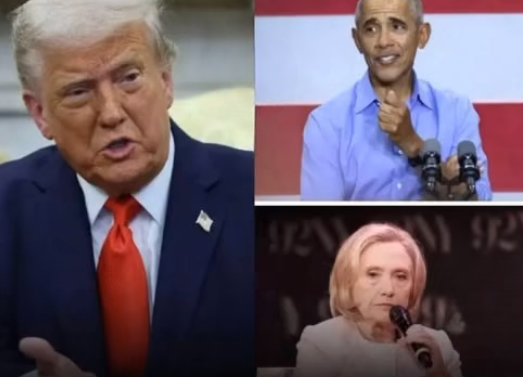Former Intelligence Officials May Face Legal Action Over Russia Investigation Origins

CIA Director John Ratcliffe Discusses Potential Criminal Charges
CIA Director John Ratcliffe has confirmed that several high-profile former government officials, including Hillary Clinton, could potentially face criminal charges related to their involvement in the origins of the Trump-Russia investigation. In recent interviews with Fox News, Ratcliffe outlined his position on what he characterizes as coordinated efforts to promote unsubstantiated claims during the 2016 presidential election cycle.
The intelligence chief has submitted multiple criminal referrals to the Department of Justice concerning individuals who allegedly participated in advancing what investigators now describe as the discredited Russia collusion narrative. Among those named in the referrals are former FBI Director James Comey, former CIA Director John Brennan, and former Secretary of State Hillary Clinton.
Department of Justice Referrals and Legal Implications
According to Ratcliffe, the statute of limitations may not protect former Obama administration officials from potential charges because conspiracy cases carry a five-year limitation period. This timeline consideration becomes significant given the dates of various testimonies provided under oath by key figures in recent years.
The CIA Director explained that extensive intelligence documentation has been provided to federal prosecutors that could potentially support criminal prosecutions. Ratcliffe noted that John Brennan testified to John Durham in August 2020 and to the House Oversight Committee in 2022, while Hillary Clinton testified before John Durham under oath in 2022, and James Comey testified before the Senate committee in September 2020.
Congressional Support and Additional Referrals
Former Congresswoman Tulsi Gabbard has also submitted formal requests to the Department of Justice for renewed investigation into the origins and implementation of the Russia probe. Gabbard has described the situation as involving allegations that intelligence officials “manufactured” intelligence that led to the opening of the investigation.
The former Democratic presidential candidate has characterized the matter as involving potential abuse of power at high levels of government, citing national security concerns and issues with public trust in intelligence institutions.
Durham Report Classified Annex to Be Released
A significant development involves the upcoming declassification of the classified annex to the 2023 Durham report, which Ratcliffe has indicated will be released in the coming weeks. The 2025 “Tradecraft Review” commissioned by CIA Director Ratcliffe reportedly challenges the legitimacy of the original 2016 intelligence assessment and examines how intelligence was handled during that period.
The classified annex to the Durham report on intelligence activities surrounding the 2016 election has been a subject of significant interest, with various officials suggesting it contains important information about the origins of the Trump-Russia investigation.
Intelligence Community Assessment and Steele Dossier Concerns
The controversy centers significantly on the Intelligence Community Assessment from 2017 and the use of information from what became known as the Steele Dossier. Reports suggest that the FBI possessed credible intelligence about the Clinton campaign’s role in developing Russia-related allegations.
Internal communications from intelligence agencies during this period have revealed concerns among some analysts about the inclusion of certain materials in official assessments. These previously classified documents show disagreements within the intelligence community about the reliability and sourcing of specific claims.
Legal Expert Analysis and Congressional Oversight
Constitutional law experts and members of Congress have called for thorough review of the evidence to determine whether federal laws may have been violated during the investigation’s origins. Potential legal issues being discussed include violations of the Hatch Act, Foreign Intelligence Surveillance Act procedures, and possible perjury charges related to congressional testimony.
The Department of Justice has not yet publicly responded to the criminal referrals or provided timeline information about potential prosecutions. Legal analysts note that such complex cases involving multiple agencies and political figures typically require extensive review periods.
Impact on Government Accountability and Public Trust
Former Obama administration officials named in these allegations have remained largely silent amid the new revelations. The situation has renewed discussions about accountability in government and the proper functioning of intelligence oversight mechanisms.
Government transparency advocates emphasize that regardless of political affiliations, the integrity of intelligence processes and adherence to legal procedures remain fundamental to democratic governance. The ongoing declassification of documents related to this period continues to provide new information for public and congressional review.
Political and Legal Ramifications
The potential for criminal charges against high-profile political figures represents a significant development in American politics. Legal proceedings of this nature typically involve extensive grand jury processes and detailed examination of evidence by federal prosecutors.
Constitutional scholars note that such cases require careful consideration of both legal standards and the broader implications for government operations and public confidence in federal institutions.
Ongoing Investigations and Future Developments
With additional intelligence documents scheduled for declassification in the coming months, this matter is expected to remain in public focus. The Department of Justice’s handling of the criminal referrals will likely influence both legal proceedings and political discourse as the 2026 midterm elections approach.
Federal prosecutors typically conduct thorough reviews of criminal referrals before making charging decisions, particularly in cases involving complex intelligence matters and high-profile individuals. The timeline for any potential legal action remains uncertain as investigations continue.
Conclusion
The allegations and criminal referrals represent a significant chapter in the ongoing examination of the 2016 election period and subsequent investigations. As declassification processes continue and legal reviews proceed, both the public and elected officials await further developments in this complex matter involving intelligence operations, political accountability, and the rule of law.